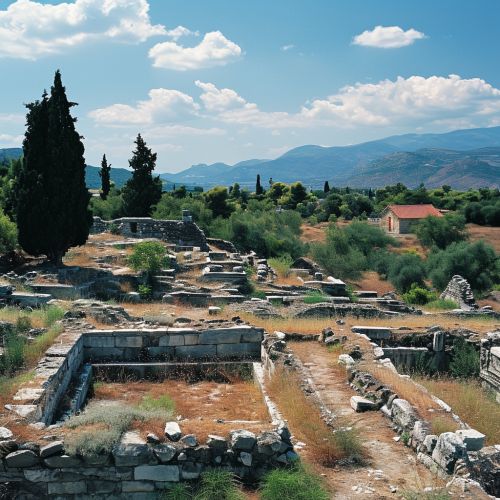History of Greece
Prehistoric and Ancient Greece

The history of Greece is one that spans several millennia, beginning with the Paleolithic period approximately 3,000,000 years ago. The first evidence of human habitation in Greece can be traced back to this era, with the discovery of Paleolithic artifacts in the Petralona Cave in ChalkidikiPetralona Cave. The Neolithic period, which began around 7000 BC, saw the development of agriculture, pottery, and the formation of small communities.
The Bronze Age in Greece (3000–1200 BC) is traditionally divided into three phases: Early, Middle, and Late. The Early Bronze Age (3000–2000 BC) is characterized by the development of urban centers, notably in Crete. The Middle Bronze Age (2000–1600 BC) saw the rise of the Minoan civilizationMinoan civilization, which was centered on the island of Crete and other Aegean islands. The Late Bronze Age (1600–1100 BC) is marked by the Mycenaean civilizationMycenaean civilization, which was centered on the Peloponnese.
The Dark Ages (1100–800 BC) followed the collapse of the Mycenaean civilization, and little is known about this period. The Archaic period (800–500 BC) saw the rise of the city-states (poleis), the establishment of colonies, and the development of the Greek alphabet. The Classical period (500–323 BC) is marked by the Persian Wars, the rise of Athens and the Athenian democracy, the Peloponnesian War, and the conquests of Alexander the GreatAlexander the Great. The Hellenistic period (323–146 BC) followed the death of Alexander and saw the spread of Greek culture across the Mediterranean.
Roman Greece
The Roman period in Greece began in 146 BC with the Roman victory over the Achaean League at the Battle of CorinthBattle of Corinth. For the next few centuries, Greece was a part of the Roman Republic and later the Roman Empire. The Romans admired and respected Greek culture, and Greek became the lingua franca in the eastern part of the Roman Empire. The city of Athens continued to be a center for philosophers and scholars.
During the Byzantine period (330–1453 AD), Greece was part of the Byzantine Empire, the eastern continuation of the Roman Empire. The Byzantine Empire was a Greek-speaking, Christian state that lasted for over a thousand years, with Constantinople (modern-day Istanbul) as its capital. The Byzantine Empire was marked by periods of ascendancy and decline, and it was during this time that the Greek Orthodox ChurchGreek Orthodox Church became firmly established.
Ottoman Greece
The Ottoman period in Greece began in the 14th century with the gradual Ottoman conquest of the Byzantine Empire. By the mid-15th century, most of Greece had come under Ottoman control. The Ottoman rule in Greece was characterized by a system of governance that allowed a certain degree of religious and cultural autonomy for the Greek Orthodox Church and the Greek community.
The Greek War of IndependenceGreek War of Independence (1821–1830) was a successful rebellion against Ottoman rule, inspired by the ideals of the Enlightenment and the French Revolution. The war ended with the establishment of an independent Greek state.
Modern Greece
The history of modern Greece begins with the establishment of the independent Greek state in 1830. The 19th and 20th centuries were marked by a series of wars, territorial disputes, and political changes. The country underwent a series of governmental forms, including a monarchy, a republic, a dictatorship, and a military junta, before becoming a parliamentary republic in 1974.
Today, Greece is a member of the United Nations, the European Union, and the North Atlantic Treaty Organization. It is a developed country with an advanced high-income economy, a high quality of life, and a very high standard of living. Its economy is the largest in the Balkans, where it is an important regional investor.
